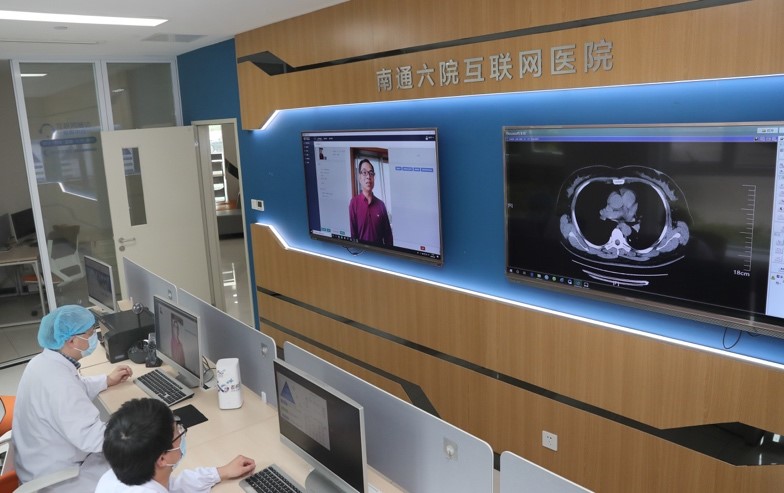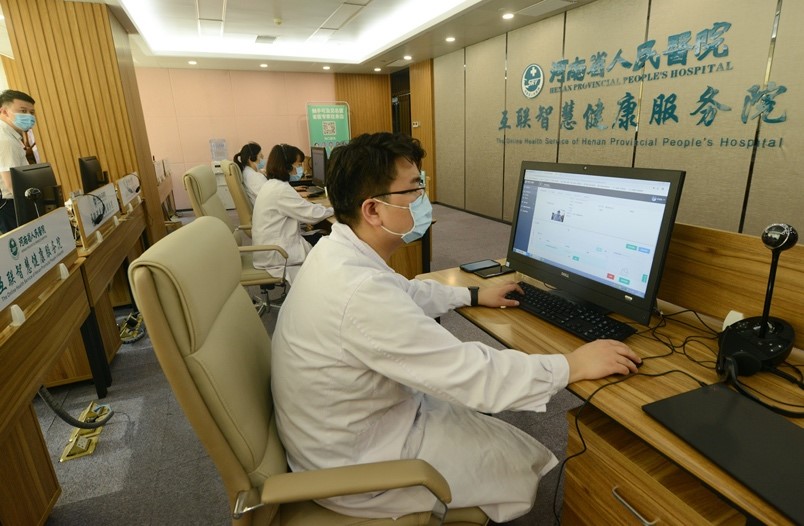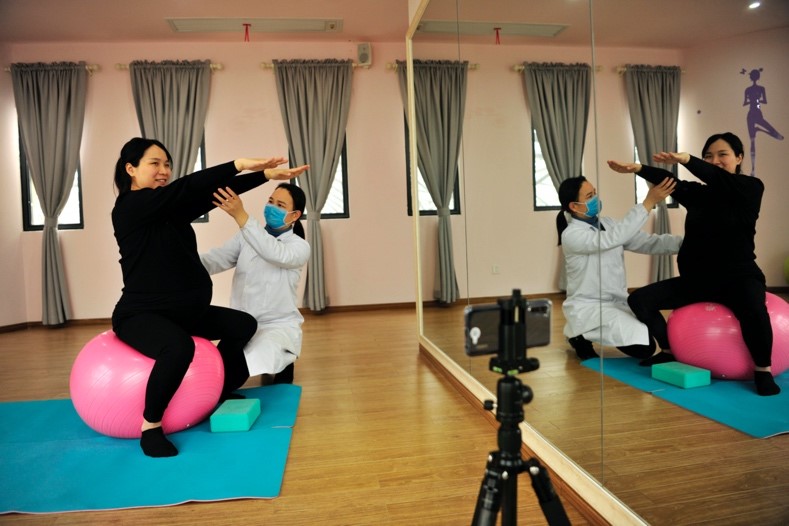
Photo taken on May 8 shows Mao Liping (left), chief physician at the Sixth People’s Hospital of Nantong, inquires about a patient’s physical conditions via a video link. Photo by Xu Congjun/People’s Daily Online
The sudden outbreak of the COVID-19 epidemic has thrown those planning for subsequent visits to hospitals in a dilemma, as they might face the exposure to the virus when refilling their prescriptions.
Fortunately, online medical care services are giving them a new and safe solution.
Through online hospitals and medical service platforms, patients are now able to consult doctors, do follow-up checks, have the medicine delivered, and even settle medical insurance on the internet.
A 64-year-old citizen surnamed Song in East China’s Jiangxi Province, who suffers from Parkinson’s disease, has benefited from such an online real-time clinic under the Sir Run Run Shaw Hospital affiliated with the School of Medicine, Zhejiang University. After consulting the doctors online, she soon received a solution on follow-up checks and drug delivery, and avoided the risk of contracting the novel coronavirus at the hospital.
Due to the pneumonia outbreak, the amount of online diagnosis and treatment at hospitals affiliated to or supervised by the National Health Commission (NHC) saw a 17-fold year-on-year increase, according to data from the Department of Planning and Information at the NHC. The number is over 20 times higher for some third-party online medical service platforms.
According to Cai Xiujun, president of the Sir Run Run Shaw Hospital, the hospital has launched consultancy hotlines, livestreaming, free consultations, AI-assisted self-examination system and psychological hotlines amid the pandemic. More than 17 million people have registered on the self-examination system, he added.
After the hospital started offering online medical insurance settlement service since Feb. 15, it became the first hospital in China to offer online follow-up examination for chronic patients, online drug delivery and automatic settlement of medical insurance.
So far, the hospital has received a total of more than 168,000 pieces of consultations, given online health consultations to over 238,000 people and provided prescription refilling and medicine delivery services for 12,120 chronic patients.
Internet technology has been seeing an increasingly wider application in the medical sector. With the help of 5G technology, the China-Japan Friendship Hospital (National Telemedicine and Connected Health Center) has carried out remote consultations for 85 pneumonia patients in Central China’s Hubei Province, and five online patient rounds, as well as given 15 livestreaming lectures on COVID-19 prevention and control.
A smart system was developed by AI experts under the organization of the Chinese Medical Doctor Association, by which medical workers admitted and treated 27,600 COVID-19 patients at 537 quarantine sites in Hubei through telemedicine.
Besides, the internet was also used to enhance psychological assistance during the epidemic as the Beijing University of Chinese Medicine and the Peking University Sixth Hospital launched online psychological consulting services.
With the efforts of medical workers, hospitals, and the society, both the amount and quality of online medical services have secured continuous growth.
A large number of doctors are joining online consulting services, and online hospitals are emerging in Shanghai, Tianjin, Chongqing, Hunan, Hubei and Gansu. Additionally, internet companies such as Baidu, Alibaba, Tencent, WeDoctor and haodf.com are also providing technical and platform supports for free.
A sound online medical ecology led by the government, participated by various parties and characterized by joint innovation, contribution and shared benefits is taking shape, which will facilitate the rapid development of the new business, said Liu Wenxian, deputy director of the Department of Planning and Information at the NHC.
China will make overall plans to encourage the integration of online and offline medical services, strengthen supervision, and standardize services to better promote the healthy growth of Internet-driven medical care business, Liu added.
As people gradually become used to seeking online medical services, the industry will diversify its content, and stimulate the development of relevant industrial groups, thus driving the overall development of the healthcare services, said Lu Qingjun, director of the China-Japan Friendship Hospital (National Telemedicine and Connected Health Center).

Photo taken on May 21 shows doctors at the Online Health Service of Henan Provincial People’s Hospital communicating with the patients online. Photo by Zhang Tao/People’s Daily Online
The sudden outbreak of the COVID-19 epidemic has thrown those planning for subsequent visits to hospitals in a dilemma, as they might face the exposure to the virus when refilling their prescriptions.
Fortunately, online medical care services are giving them a new and safe solution.
Through online hospitals and medical service platforms, patients are now able to consult doctors, do follow-up checks, have the medicine delivered, and even settle medical insurance on the internet.
A 64-year-old citizen surnamed Song in East China’s Jiangxi Province, who suffers from Parkinson’s disease, has benefited from such an online real-time clinic under the Sir Run Run Shaw Hospital affiliated with the School of Medicine, Zhejiang University. After consulting the doctors online, she soon received a solution on follow-up checks and drug delivery, and avoided the risk of contracting the novel coronavirus at the hospital.
Due to the pneumonia outbreak, the amount of online diagnosis and treatment at hospitals affiliated to or supervised by the National Health Commission (NHC) saw a 17-fold year-on-year increase, according to data from the Department of Planning and Information at the NHC. The number is over 20 times higher for some third-party online medical service platforms.
According to Cai Xiujun, president of the Sir Run Run Shaw Hospital, the hospital has launched consultancy hotlines, livestreaming, free consultations, AI-assisted self-examination system and psychological hotlines amid the pandemic. More than 17 million people have registered on the self-examination system, he added.
After the hospital started offering online medical insurance settlement service since Feb. 15, it became the first hospital in China to offer online follow-up examination for chronic patients, online drug delivery and automatic settlement of medical insurance.
So far, the hospital has received a total of more than 168,000 pieces of consultations, given online health consultations to over 238,000 people and provided prescription refilling and medicine delivery services for 12,120 chronic patients.
Internet technology has been seeing an increasingly wider application in the medical sector. With the help of 5G technology, the China-Japan Friendship Hospital (National Telemedicine and Connected Health Center) has carried out remote consultations for 85 pneumonia patients in Central China’s Hubei Province, and five online patient rounds, as well as given 15 livestreaming lectures on COVID-19 prevention and control.
A smart system was developed by AI experts under the organization of the Chinese Medical Doctor Association, by which medical workers admitted and treated 27,600 COVID-19 patients at 537 quarantine sites in Hubei through telemedicine.
Besides, the internet was also used to enhance psychological assistance during the epidemic as the Beijing University of Chinese Medicine and the Peking University Sixth Hospital launched online psychological consulting services.
With the efforts of medical workers, hospitals, and the society, both the amount and quality of online medical services have secured continuous growth.
A large number of doctors are joining online consulting services, and online hospitals are emerging in Shanghai, Tianjin, Chongqing, Hunan, Hubei and Gansu. Additionally, internet companies such as Baidu, Alibaba, Tencent, WeDoctor and haodf.com are also providing technical and platform supports for free.
A sound online medical ecology led by the government, participated by various parties and characterized by joint innovation, contribution and shared benefits is taking shape, which will facilitate the rapid development of the new business, said Liu Wenxian, deputy director of the Department of Planning and Information at the NHC.
China will make overall plans to encourage the integration of online and offline medical services, strengthen supervision, and standardize services to better promote the healthy growth of Internet-driven medical care business, Liu added.
As people gradually become used to seeking online medical services, the industry will diversify its content, and stimulate the development of relevant industrial groups, thus driving the overall development of the healthcare services, said Lu Qingjun, director of the China-Japan Friendship Hospital (National Telemedicine and Connected Health Center).

The sudden outbreak of the COVID-19 epidemic has thrown those planning for subsequent visits to hospitals in a dilemma, as they might face the exposure to the virus when refilling their prescriptions.Photo taken on March 13 shows an obstetrician at a hospital in Jiangxi Province helps a pregnant woman practice yoga on a live broadcast. Photo by Deng Longhua/ People’s Daily Online
Fortunately, online medical care services are giving them a new and safe solution.
Through online hospitals and medical service platforms, patients are now able to consult doctors, do follow-up checks, have the medicine delivered, and even settle medical insurance on the internet.
A 64-year-old citizen surnamed Song in East China’s Jiangxi Province, who suffers from Parkinson’s disease, has benefited from such an online real-time clinic under the Sir Run Run Shaw Hospital affiliated with the School of Medicine, Zhejiang University. After consulting the doctors online, she soon received a solution on follow-up checks and drug delivery, and avoided the risk of contracting the novel coronavirus at the hospital.
Due to the pneumonia outbreak, the amount of online diagnosis and treatment at hospitals affiliated to or supervised by the National Health Commission (NHC) saw a 17-fold year-on-year increase, according to data from the Department of Planning and Information at the NHC. The number is over 20 times higher for some third-party online medical service platforms.
According to Cai Xiujun, president of the Sir Run Run Shaw Hospital, the hospital has launched consultancy hotlines, livestreaming, free consultations, AI-assisted self-examination system and psychological hotlines amid the pandemic. More than 17 million people have registered on the self-examination system, he added.
After the hospital started offering online medical insurance settlement service since Feb. 15, it became the first hospital in China to offer online follow-up examination for chronic patients, online drug delivery and automatic settlement of medical insurance.
So far, the hospital has received a total of more than 168,000 pieces of consultations, given online health consultations to over 238,000 people and provided prescription refilling and medicine delivery services for 12,120 chronic patients.
Internet technology has been seeing an increasingly wider application in the medical sector. With the help of 5G technology, the China-Japan Friendship Hospital (National Telemedicine and Connected Health Center) has carried out remote consultations for 85 pneumonia patients in Central China’s Hubei Province, and five online patient rounds, as well as given 15 livestreaming lectures on COVID-19 prevention and control.
A smart system was developed by AI experts under the organization of the Chinese Medical Doctor Association, by which medical workers admitted and treated 27,600 COVID-19 patients at 537 quarantine sites in Hubei through telemedicine.
Besides, the internet was also used to enhance psychological assistance during the epidemic as the Beijing University of Chinese Medicine and the Peking University Sixth Hospital launched online psychological consulting services.
With the efforts of medical workers, hospitals, and the society, both the amount and quality of online medical services have secured continuous growth.
A large number of doctors are joining online consulting services, and online hospitals are emerging in Shanghai, Tianjin, Chongqing, Hunan, Hubei and Gansu. Additionally, internet companies such as Baidu, Alibaba, Tencent, WeDoctor and haodf.com are also providing technical and platform supports for free.
A sound online medical ecology led by the government, participated by various parties and characterized by joint innovation, contribution and shared benefits is taking shape, which will facilitate the rapid development of the new business, said Liu Wenxian, deputy director of the Department of Planning and Information at the NHC.
China will make overall plans to encourage the integration of online and offline medical services, strengthen supervision, and standardize services to better promote the healthy growth of Internet-driven medical care business, Liu added.
As people gradually become used to seeking online medical services, the industry will diversify its content, and stimulate the development of relevant industrial groups, thus driving the overall development of the healthcare services, said Lu Qingjun, director of the China-Japan Friendship Hospital (National Telemedicine and Connected Health Center).
(By Li Hongmei | From People's Daily)







